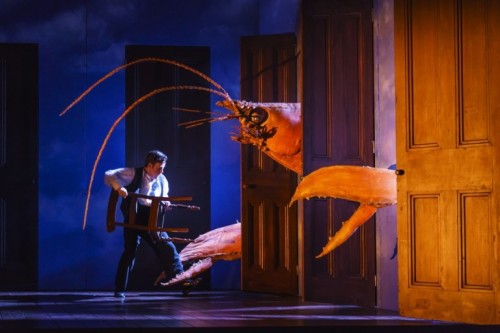 United Kingdom Mozart, The Magic Flute: Soloists, Chorus and Orchestra of Welsh National Opera / Damian Iorio (conductor). Theatre Cymru, Llandudno, 24.4.2019. (RJF)
United Kingdom Mozart, The Magic Flute: Soloists, Chorus and Orchestra of Welsh National Opera / Damian Iorio (conductor). Theatre Cymru, Llandudno, 24.4.2019. (RJF)

Production:
Director – Dominic Cooke
Revival director – Caroline Chaney
Set designer – Julian Crouch
Costume designer – Kevin Pollard
Lighting designer – Chris Davey
Original Movement director – Sue Lefton
English translation – Jeremy Sams
Cast:
Tamino – Ben Johnson
Pamina – Anita Watson
Papageno – Mark Stone
Queen of the Night – Samantha Hay
Sarastro – James Platt
Monostatos – Howard Kirk
Papagena – Claire Hampton
First Lady – Jennifer Davis
Second Lady – Kezia Bienek
Third Lady – Emma Carrington
First Priest – Simon Crosby Buttle
Second Priest/Speaker – Phillip Rhodes
With the death of the enlightened Emperor Joseph II, who had commissioned Così fan tutte and perhaps even have suggested its plot to Mozart, the composer’s source of operatic patronage appeared to have dried up. Given his parlous financial state he welcomed Emanuel Schikaneder’s suggestion that he compose a magic opera for his Theater auf der Wieden. The two had resumed friendship when Schikaneder returned to Vienna in 1789 and they shared the fellowship of the same Masonic Lodge. Theater auf der Wieden was popular holding around 1000 and mounted productions featuring elaborate machinery, live animals, spectacular lighting and scenic effects. These were interspersed with topical jokes in the local patois and songs to suit an unsophisticated audience.
Various sources have been suggested for the basis of Schikaneder’s libretto with much discussion of the relationship of the trials undergone by Tamino and Pamina, and the triumph of good over evil, to the Masonic background of composer and librettist. The Masonic influence is also claimed by the significance frequent occasions the number three occurs in the opera as it is said that this number is significant in Freemasonry. Certainly the number occurs with the Three Ladies, Boys, and Doors as well as in the musical structure. What really destroys this argument for the work being a Masonic allegory is the fact that there are only two trials, of fire and water, required of initiates. If there were any Masonic allusions it would be to the three steps and trials an initiate has to undergo to raise to the sublime degree of Master Mason.
Dominic Cooke’s 2005 staging has seen regular revivals at Llandudno in 2008, 2010 and 2015. Having seen those latter three I cannot honestly say that it improves with each subsequent revival. The shoebox stage set, with several doors, does not challenge the imagination or allow for imaginative expression for the singers who pop in and out. More frustrating is the vote for Tamino’s admission to the sect which involves orange bowler-hatted heads protruding from under the stage, waving their umbrellas as they vote. It produced copious giggles from the audience, and even outright laughter when the closing of the openings – that facilitated the procedure – came unstuck and footwear of a chorus member had to be used to shut it closed. Enough is enough, a new and more imaginative production should be mounted at the first opportunity. I cannot help but note that Opera North has a new production, albeit of little distinction. It is perhaps regrettable that an earlier practice between our two major regional opera companies to work in concert and share productions is no longer active. Twenty or so years ago productions of L’elisir d’amore and The Barber of Seville, were shared and toured; both of which gave excellent service, as well as, economic benefits that could be used to expand repertoire.
Fortunately the limitations of the staging have – yet again – not impaired performance, musical, sung or acting; all virtues that come with proper and detailed preparation time. Ben Johnson’s Tamino has a natural Mozartian patina. So to, alongside a ready natural wit, has Mark Stone as Papageno, his timing being spot on. A particularly notable stage presence came from James Platt whose physical stature must be a plus for the great Verdi and Wagner bass roles that surely await him and his development. Of the ladies Anita Watson was a rounded sung and acted characterisation to go alongside her appealing stage presence, whilst Samantha Hay’s entrances as a fine Queen of the Night would have benefited from better staging. All the lesser roles were sung well, not least by the three ‘boys’. In charge of the music Damian Iorio seemed to me to have an ideal Mozartian touch.
Along with myself, the audience at the conclusion buzzed with happiness. My mood didn’t last! It quickly changed when I found a parking notice on my windscreen and that despite my wife’s blue badge being prominently on view. It seems Venue Cymru do not own the large associated parking adjacent to the theatre: it is under control of the local council with no help for the handicapped and so it is a matter pay and display or get a ticket! Future visitors take note and, I suggest, Venue Cymru should make an effort to notify clients as to the situation. Also there didn’t seem enough seats in the foyer for the early arriving disabled. Caveat emptor.
Robert J Farr
